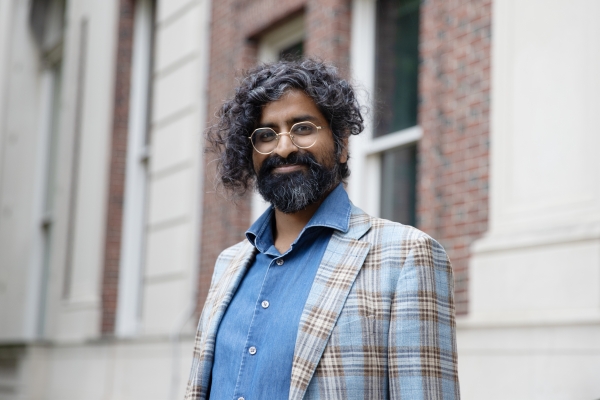
Emma Asher
In this new series, we’ll speak with professors who lead different sections of the Core Curriculum to learn what they love about engaging with College students. This month we chat with assistant professor of philosophy Dhananjay Jagannathan, who teaches Literature Humanities. He specializes in ancient Greek and Roman philosophy, the history of ethics and political philosophy, and value theory.
How do you put your own spin on teaching Lit Hum?
Lit Hum is very dense, and it’s very fast moving. One of the things I try to emphasize is that we’re not undergoing this forced march through history for the sake of having a historically sensitive and careful grasp of all the details. You have to know something about the context and about the tradition to appreciate what’s going on in these texts, but the point is to try to confront them from whatever position you find yourself in; to try to make sense of what they’re saying about what human beings are, what we’re capable of, what our limits are. Those are questions that confront every human being in all kinds of ways in our practical lives, in our thinking about other subjects, in our confrontation with the idea of university education as a kind of worthwhile goal in itself. So the spin that I try to provide is to try to bridge the gap between these — sometimes very far distant in time, space and cultural context — literary objects and our own context.
One way I try to do this is to show the long aftermath of influence some of these texts have. When we read The Odyssey, I like also reading one of my favorite 20th-century poems, Constantine Cavafy’s “Ithaka.” And this year, my class is going to watch O Brother, Where Art Thou?, a film that’s only about 25 years old but has strong resonance with The Odyssey. Another way is just thinking about the issues. I want to talk about war and what it does to people; that’s a subject of perennial interest we’ll deal with when we talk about The Iliad. And later this semester we’re reading a Sanskrit epic, Bharavi’s “Arjuna and the Hunter,” which covers a lot of the same themes that the Greek and Roman epics do. So it’s thinking about how the same themes come up in very different cultural contexts and what that might say about differences and commonalities in experiences across time.
What are you teaching that feels especially relevant for this moment?
I take a lot of joy in teaching Augustine’s Confessions, which, in my experience, is not the most loved text on the syllabus. It’s very difficult to get into in some ways. But it has a lot of fascinating insights about the nature of the human mind, and what our relationship is to our own past and also to humanity’s past in general. And I think those are questions that are having renewed resonance in the digital age, especially in an era in which we are very concerned with self-presentation, and maybe even with self-creation. There’s a lot in Augustine that helps us grapple with that — he invents, among other things, the genre of autobiography by writing about himself. And that’s striking. He’s very concerned with himself as a problem, and I think that’s something that we can all relate to very powerfully.
What has been your favorite Lit Hum teaching moment?
For me it’s more the question of, “What was your most significant teaching moment?” I was teaching Lit Hum when the Covid-19 pandemic reached New York City in the spring of 2020, and we were all sent home. One of the texts that we were reading was Dostoevsky’s Notes from Underground. The descriptions and comments on society, while trapped inside, were very poignant. Not just for the students, but also for me — teaching classes from my dining room table, having hastily taken my books and my desktop computer from my office in the middle of the night. My students were scattered around the country, and sometimes around the world, Zooming into classes in sometimes difficult circumstances. It was striking to have a text that describes social isolation so powerfully. I think that was quite pertinent to all of us and offered a vehicle to think about those issues with a little bit of remove.
That’s one of the nice things about Lit Hum. We’re faced with very big and important questions about what it is to be a human being and what the good life for human beings might be. But we’re also given the space to engage with them not in a purely practical way, thinking through other people’s answers to those questions and how that might relate to our own context but not, precisely, in order to change things; although I think a lot of students find that they’re changed by the course — and I certainly find myself changed by teaching it — but in unexpected ways, without an agenda, without a program. So that’s one example of a thing that I think happens in less dramatic ways all the time — at least if the class is going well.